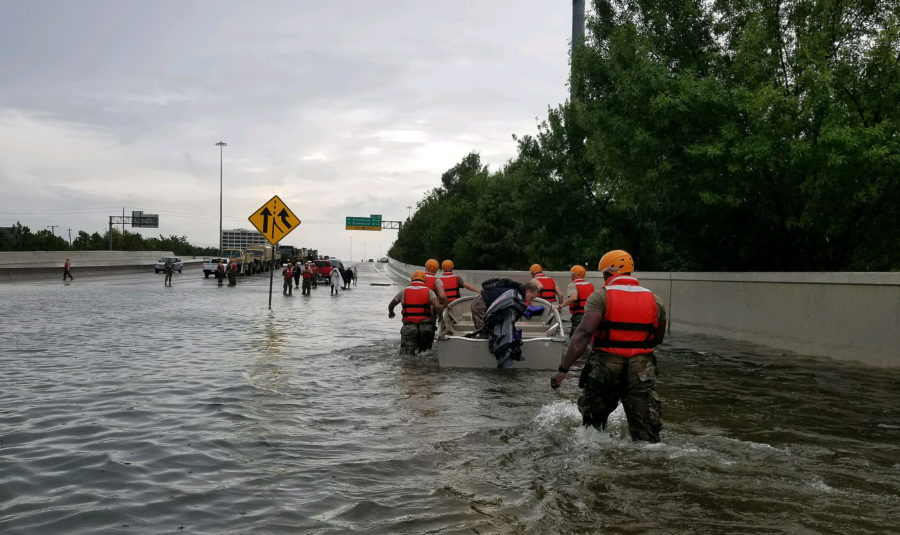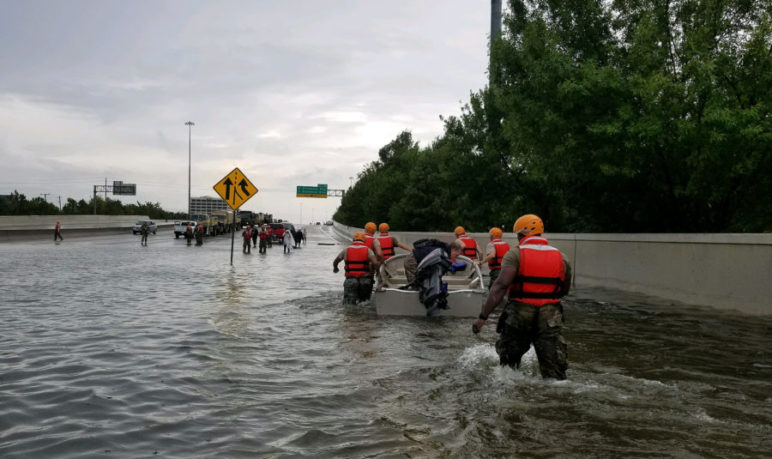I won’t surprise anyone by saying that Americans are increasingly polarized. It follows—unfortunately—that people continue to look at the world, and issues of science and other facts, through an increasingly tinted partisan lens.
Take climate change.
Almost half of Americans (49 percent) say they believe global warming is a major cause in the increase of recent hurricanes.
While Americans of all stripes support hurricane aid to victims “even if no other correspondent funding is cut” (74 percent), including a broad seven in 10 conservatives (69 percent), a new CNN poll tells us that party identity dictates how people interpret the disasters unfolding in Texas, Florida, and Puerto Rico.
A partisan lens on science
Almost half of Americans (49 percent) in that poll say they believe global warming is a major cause in the increase of recent hurricanes—up from just 36 percent in a 2005 poll. Only about one in four (28 percent) say it’s not a cause at all. But a majority of Republicans (55 percent) think that climate is not a cause at all.
Partisan divides are stark: 78 percent of Democrats believe climate change plays a major role, up 30 percentage points from 2005. On the other hand, only 15 percent of Republicans say the same, down 10 points in the same time frame. Almost half of independents believe it plays a major role (48 percent)—up from one in three over a decade ago (34 percent).
In a different poll, voters weren’t quite so predictable. When asked about the contribution of climate change to recent natural disasters, such as the hurricanes that ravaged parts of Texas and Louisiana, 61 percent of voters—including 52 percent of GOP voters—said the changing climate had at least some impact, while 21 percent believed it had little or no impact; another 18 percent of voters did not know or had no opinion.
A HuffPost/YouGov poll, post-Harvey, found a plurality of American voters thought climate change played a role in the Texas flooding including 77 percent of Clinton voters. About a third said they think climate change played “a not very important role” or “no role at all,” including 76 percent of Trump voters.
People are sensitive to polling question language. A conservative might be far more comfortable, for example with wording like “at least some impact” than they are with “played a major role.” Lots of us get antsy when we see words like “cause.” As Climate Nexus suggests, we should be asking the right questions when we talk about hurricanes and other extreme weather events: “How is climate change influencing events?” instead of “Did climate change cause this storm?”
There’s progress but it’s polarized
Weather disasters supercharged by climate change do have the power to influence attitudes. GOP registered voters, like all voters, appear at least somewhat sensitive to the climate signals that severe weather is sending. As the CNN poll showed, we are seeing progress from a decade ago. In a 2005 Post-ABC poll, taken a month after Hurricane Katrina ravaged the Gulf Coast and devastated New Orleans, only 39 percent of Americans said they believed climate change helped to fuel the intensity of hurricanes. Today, according to a new Washington Post-ABC News poll , a majority say that global climate change contributed to the severity of recent hurricanes in Florida and Texas—55 percent. But gains are almost entirely made up of Democrats and Independents. Attitudes among Republicans have hardly changed over the same period. About 72 percent currently say that the severity of recent storms was merely the result of the kind of intense weather events that materialize periodically. In 2005, 70 percent had that view.
Still, fifty-seven percent of GOP registered voters said they were concerned about climate change and its impact on the environment, up 7 percentage points from April, according to a Morning Consult/POLITICO survey conducted September 7 through September 11—just as Hurricane Irma was sweeping through the Caribbean and Florida.
Fifty-two percent of registered voters polled by Morning Consult/POLITICO think that climate change is making natural disasters more frequent, and the same percentage said climate change is making those disasters more powerful. Twenty-five percent disagreed with each statement. Republicans were the only partisan group closely split on the issue of frequency, with 40 percent saying they believe climate change makes natural disasters more frequent and 41 percent disagreeing.
Personal experience and age play a role
People’s personal experience and proximity to these disasters probably affects their attitudes. As Morning Consult‘s Iulia Gheorghiu writes, “in the wake of Hurricanes Harvey and Irma, forty-one percent of respondents who reside in the South said they were very concerned about climate change’s impact on the US environment, up 8 percentage points from the spring survey.”
Age is also a factor in attitudes. According to the Washington Post-ABC News poll, 67 percent of adults younger than 30 and 64 percent of adults in their 30s say climate change contributed to the intensity of Harvey, Irma and Maria. Only about half of people between the ages of 40 and 64 think that is the case, and that understanding is even lower for those over 65.
Climate wake up calls? Or do we hit the “snooze” button again?
Time will tell. Partisanship builds up views and time can wash them away.
As Climate Central reported a while back, things don’t really change in public opinion in dramatic ways. It’s a slow evolution. Chris Borick, the director of the Muhlenberg College Institute of Public Opinion told Climate Central that “It’s more the norm that people don’t change their views than do change their views, especially when something becomes more entrenched with ideological and political arguments.”
Indiana University public and environmental affairs professor David Konisky (who authored a recent study with Aaron Ray of American University, Llewelyn Hughes of Australian National University and Charles Kaylor of Temple University) echos that: “The most important drivers of people’s attitudes toward climate change are their political leanings.” These scholars also show what we’ve witnessed first-hand after past heartbreaking severe weather disasters (remember Sandy?): Individuals experiencing extreme weather activity are more likely to support climate policy, but the change in support is modest and inconsistent, and the effect on opinion diminishes over time.












Timothy Colman
Thanks Anna.
Have you watched this piece on Democracy Now with fellow green George Monbiot? Monbiot has flipped me on even using the phrase climate change and instead call it by its real name: climate destruction. I think any assessment of communicating about climate destruction that doesn’t mention the word capitalism is dishonest. The fossil fuel industry wants you to keep saying climate change- sounds so bland, “like calling a foreign invasion “unexpected guests.” See what you think here:
https://www.democracynow.org/2017/8/31/george_monbiot_we_cant_be_silent